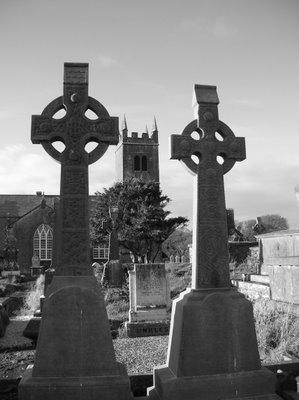
Finished reading: The Bedford Companion to Shakespeare & A Midsummer Night’s Dream. Now I want to watch every film production there is of it! Any recommendations; what’s your favorite version?
Since the theme of this blog is “poetry & faith,” I thought it would be appropriate to open my Shakespeare studies with some meditations on Christianity, spirituality, and morality in the works of the Bard. I do not intend to make an apologetic here for Shakespeare’s personal faith (knowing nothing about that) nor about the exclusive, orthodox Christianity of his works (not being convinced of that), but rather to trace some relationships of his texts to Biblical truth, whether these relationships are positive or negative. This is by no means intended to be anything like comprehensive! —just a few current thoughts. I imagine, even hope, these thoughts will change throughout the summer. So, here they are. Pardon the sometimes erroneous quotes; I’m working on a train as I travel across Ireland, with only Dream ready to hand.
So here are a few topics for thought and future discussion.
1. Quotations from Scripture
Shakespeare does not often quote directly from Scripture. I do not have a thorough enough knowledge to say whether, when he does, the lines are in the mouths of clowns, educated people, aristocracy… and if they are misquoted or misused. Here’s just one example:
Dream 4.I.207-210. Bottom: “The eye of man hath not heard, the ear of man hath not seen, man’s hand is not able to taste, his tongue to conceive, nor his heart to report what my dream was.” A typical mangling by bully Bottom; and another example of an oft-misused quote. The passage in I Cor. goes on to say: “But God hath revealed them unto us by his spirit.” So Bottom, like many people, takes it up wrong. Bottom often does that.
2. Biblical references
Beyond exact quotations, Shakespeare’s diction is heavily influenced by his familiarity with the vocabulary, syntax, and cadences of both the Bible and the Book of Common Prayer; attendance at Anglican services was mandatory during his lifetime. The Bible he would have heard every week at church was (not the King James, obviously, until 1611, only 5 years before his death) the Geneva Bible. Russ McDonald claims that the Bible was the most important of Shakespeare’s indirect sources (i.e., texts S must have read & known, but which did not supply plots or characters, etc.) The cover page of the Geneva Bible (1560) shows a map of the apostles’ journeys; Shakespeare used its places names in 12th Night (Illyria), Errors (Siracuse), Othello (Cyprus, Pontick Sea), and Julius Caesar (Phillpi) [McDonald 164]. Its tones and timbres can be heard throughout his work.
3. Doctrinal allusions
Heaven & Hell figure prominently in the plays. Whether or not Shakespeare believed in them (and he would have, if he held to either the doctrine of the official church or the banished Catholic faith), his characters certainly do. I am trying to trace whether evil characters typically ignore or flout damnation. Here are some references to Heaven & Hell:
Hamlet: Now he’s praying, now I could do it pat, and so he goes to Heaven, and thus am I revenged?
Rather nastier than we’d like of a “hero,” equivocal though he may be. Murder is not enough for Claudius; he must go to hell, too.
Macbeth said if he could be certain of the consequences of his act, he’d “jump the life to come,” i.e. forget about the afterlife and just do it here and now where he could enjoy the spoils. But he realizes even here he would suffer for his sin—then does it anyway.
Macbeth: There is the bell. Hear it not, Duncan; it is a knell that summons thee to Heaven or to Hell.
I find it strange that he doubts Duncan’s destination, seeing that his virtues are like angels and celestial trumpet blasts.
Macbeth to Banquo in absentia: Thy soul, if it find heaven, must find it out tonight.
More certain, but still that doubt about his best friend’s salvation. I suppose if he can do what he has done, against his character, conscience, duty, loyalty, and hospitality, he realizes anyone is capable of vast evil, even Duncan, even Banquo.
H & H often become metaphoric. In Dream, Hermia says of Athens that Lysander’s love, given the seeming impossibility of their union, “hath made a heaven a hell” and thus puts those two states on earth and into temporality. As many lovers have done, and always shall do, I’m sure. The presence of the loved one brings Heaven, his/her absence, Hell. Microcosm for the presence and absence of God in an absolute, eternal sense, I’m sure, given the constant marital and sexual metaphors for faith/spiritual fidelity in the Bible. Juliet, unable to discover whether Romeo is dead when Nurse comes bearing her babbled news about Tybalt, cries: “What devil art thou that dost torment me thus? This torture should be roared in dismal hell!” Romeo, hearing of his banishment, mourns that “Heaven is here, where Juliet lives, and every cat and dog and little mouse may look on her, but Romeo may not!”
Add to these the interesting fact that the ceiling over the stage was called the heaven, and the “cellarage” beneath, the hell.
Hamlet, interestingly, makes no mention of either place in his great after-life speech. He fears not the fires and pains of hell, but the dreams that may come in the sleep of death, the “something after death, that undiscovered country from who bourne no traveler returns.” If only he could have rest, his “quietus,” he might “jump” the Almighty’s canon which is fixed ‘gainst self-slaughter.
Similarly, characters often refer to providence as a guiding force. Romeo, fearing “some consequence yet hanging in the stars,” throws off his worries with “but he who has the steerage of my course direct my suit [sometimes emended to ‘sails.’].” However, some editors interpret this as a reference of the god of Love, not to the Christian God; hum.
One last doctrinal inference for today. Paulina in The Winter’s Tale seems aptly named: like St. Paul, she harps on themes of repentance, forgiveness, and faith: Stephen Orgel reasons that “the emphasis in the play’s resolution on the evidence of things not seen, the primacy of the spirit over the letter, salvation through faith—on the tenets, in short, of Pauline Christianity—[must] account for Paulina’s name” (Oxford 60). At the end, after having chided the king into 16 years of repentance, guarding him from an (adulterous, it turns out) remarriage, and essentially preserving the chastity and sanctity of the royal couple, asks Leontes to “awake your faith.” He does, and all is restored.
4. Moral “lessons”
This is the easiest to trace, and I’m sure it’s been done ad nauseum. But stop and think, for a moment, about the great moral power of a theatrical masterpiece. Isn’t it much more effective to watch the maddening, hardening, despairing results of murder than to hear “Thou shalt not murder”? Fear of Aren’t you more moved to avoid jealously and mistrust after Othello than after Sunday School? Do you not fear to be an Iago, Macbeth, Richard III, Lear, or even Hamlet more than to be a Scott Peterson, OJ Simpson, Richard Nixon, Saddam Hussein, or Prince William in his Nazi uniform? These modern figures, for all their media hype, seem remote from our everyday experiences, faults, and temptations. When we finish watching the Enron trials, the average American probably does not sense the tugging of his sinful nature towards that wrong: yet when we finish watching Macbeth, we know the depths of our own inclination, and feel that even we, honest and upright as we may be, could stoop to such a deed! If one such as he, with a strong conscience and sense of moral honesty, could do bloody murder, why not we, weakened as we are with materialism and sensuality? Shakespeare makes us beware our sinful selves, and that without platitudes.
So, just some thoughts to whet my appetite. Look for more to come in the future!



